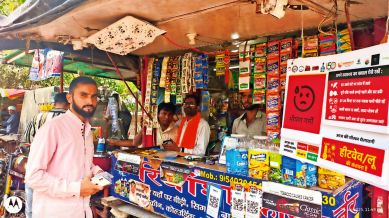An award-winning journalist with 14 years of experience, Nikhil Ghanekar is an Assistant Editor with the National Bureau [Government] of The Indian Express in New Delhi. He primarily covers environmental policy matters which involve tracking key decisions and inner workings of the Ministry of Environment, Forest and Climate Change. He also covers the functioning of the National Green Tribunal and writes on the impact of environmental policies on wildlife conservation, forestry issues and climate change. Nikhil joined The Indian Express in 2024. Originally from Mumbai, he has worked in publications such as Tehelka, Hindustan Times, DNA Newspaper, News18 and Indiaspend. In the past 14 years, he has written on a range of subjects such as sports, current affairs, civic issues, city centric environment news, central government policies and politics. ... Read More
IMD to help informal workers, vendors cope with extreme weather — one WhatsApp alert at a time
Currently, the 35-member WhatsApp group, named ‘Daily Bulletin - IMD/Citizens’, receives direct forecasts from the weather body in the form of text messages, voice notes in Hindi and simple infographics.

As sizzling temperatures of over 40 degrees Celsius in New Delhi this week prompted the national weather body to issue a heat wave red-alert, winds of change were blowing inside the Mausam Bhawan auditorium too.
Standing before a packed gathering of gig workers, street vendors, waste pickers and domestic workers in the auditorium on June 12, India Meteorological Department (IMD) director-general Mrutyunjay Mohapatra officially unveiled a collaboration with these workers for sharing of direct, simple and daily weather forecasts, especially heatwave warnings, one WhatsApp alert at a time.
monthly limit of free stories.
with an Express account.
The “special” occasion also saw the IMD director-general unveil colour-coded placards — one of which showed a distressed-looking emoji and used the colour red to amplify the heat-wave warning — to disseminate simplified weather information.
Nearly a month ago, non-government organisation Greenpeace India and a collective of Delhi-based workers’ unions had approached the IMD with a proposal for direct sharing of weather information over WhatsApp. Soon enough, all the stakeholders concerned rolled out a pilot programme, starting with a WhatsApp group.
Currently, the 35-member WhatsApp group, named ‘Daily Bulletin – IMD/Citizens’, receives direct forecasts from the weather body in the form of text messages, voice notes in Hindi and even simple infographics (information in chart form).
Union representatives, who are members of this WhatsApp group, act as “climate messengers”, which includes disseminating heat alerts and other weather warnings in markets and waste collection points via colour-coded placards, handwritten forecast notices, and in their own WhatsApp groups.
Commending the unions and the NGO “for giving the IMD an opportunity to connect directly with the people”, Mohapatra emphasised that vendors, domestic workers and other gig workers should take more precautions since “they are more vulnerable to the impacts of the rising heat”.
“Loo-like conditions, their frequency and intensity are rising. The frequency of warmer nights is also rising. When our body temperature crosses 40 degrees Celsius, it starts impacting how we cool down. It impacts our health adversely. If we are unable to cool down, it can cause a heat stroke,” he informed the audience.
Additionally, under what the unions termed as “vendor social responsibility (VSR)”, vendors have installed hydration points and displayed early-warning notice boards on carts in markets across north Delhi’s Guru Teg Bahadur (GTB) Nagar and Mukherjee Nagar, and Old Delhi’s Meena Bazaar (correct). The unions are also planning to build canopies that will serve as resting spaces in these markets.
One such vendor, Anupam Kumar Chaurasia, has displayed notice boards at his tea and samosa stall outside GTB Nagar metro station. Chaurasia, who has also set up a hydration point, says not only has the rising heat caused his skin to blister, it has also shrunk his income “in half” since fewer people are out and about during the day.
“I have started keeping free drinking water in my stall. Other vendors in the area split the cost of water refills with me. Customers who read these weather notices appreciate the initiative,” he says with a beaming smile.
To cope with a heat stroke-like emergency, Chaurasia says he has started keeping glucose powder on his person at all times.
“The audio forecasts are straightforward. They are easier to comprehend than the weather information available on the Internet,” he says.
Sheikh Akbar Ali of the Basti Suraksha Manch, which works for the rights of waste pickers and informal workers, and their housing rights, says early warnings are extremely important for his union since waste collection points and landfills are hotter than other places.
“Besides sharing audio forecasts, leaders of our waste picker groups advise us on what to wear and to carry water at all times. They also tell us to avoid prolonged heat exposure during peak afternoon hours,” says Ali.
Stating that the initiative empowers workers to be at the “forefront” of climate action, Sandeep Verma of the National Hawkers’ Federation says, “Vendors, workers and waste pickers contribute near-zero carbon emissions since they don’t have the resources to pollute. However, they bear the worst impacts of climate change, in the form of extreme heat, cold and rain. The workers can now take the lead in ensuring that early warnings and forecasts reach their communities, which can act on them.”
Amruta, a Greenpeace India representative, says this collaboration is not just about sharing information. “This collaboration is about building local resilience and enabling communities to act on that information. It is a call to recognise extreme heat as a national disaster demanding urgent, systemic response.”
Stating that the pilot programme may be expanded to other cities, IMD’s Mohapatra says the ultimate objective of the initiative was to “take science to the people and to empower them with scientific information”.